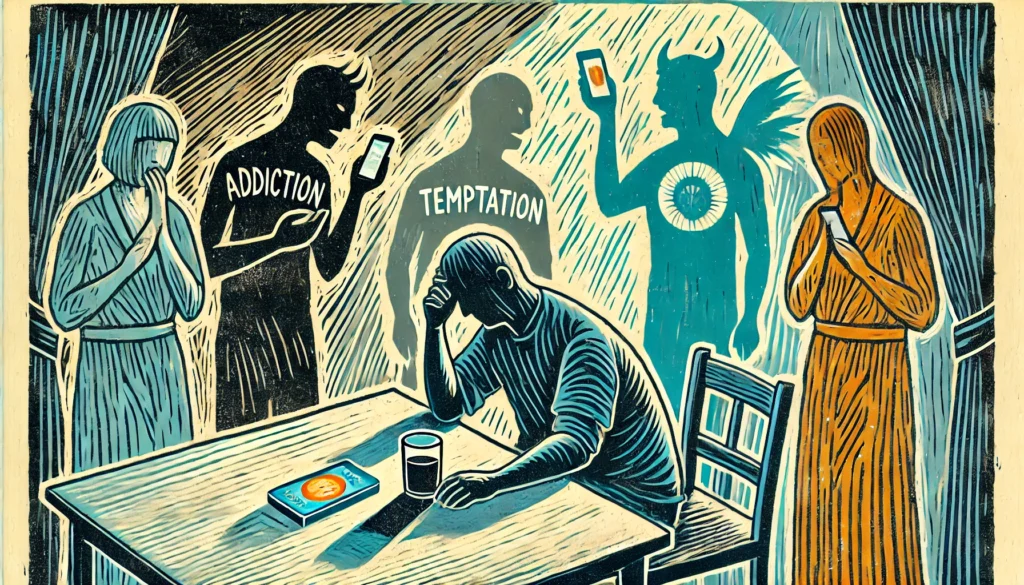READ IT TO ME: Click play to listen to this post.
Living out a sober life is quite a feat regardless of the addiction. Cravings dominate to varying degrees. Commitments begin to melt down as soon as some addicts close their mouths in a 12-step meeting. We have all heard stories of addicts who swore to commit to sober living and who began acting out before they left the parking lot. I once led a group of sex addicts where one of the addicts was sexting his affair partner just after his share while the meeting was in progress! The truth is that intrigue is a drunken dreamland with bewitching charm. The junkie worm that undermines rational sober living is:
“like a hard-nosed hound, the lion never ends its chase. It lures me to the dance, as I look to hide my face—The monkey’s always talkin’ trash in his deep clear voice—
He talks about a paralyzed paradise—
I quickly lose my choice”
—Stalking the Lion King by K.W.
From another perspective, sobriety can be like nailing jelly to a tree. If I’m an alcoholic, obviously getting loaded with alcohol is an example of relapse. But what about substituting a favorite IPA beer with an O’douls or any other of a number of non-alcoholic beer choices that have 0.4 percent alcohol content? Am I sober with this choice? For sure, some hard-core recovering folk will answer with the charge that you are just bullshitting yourself while others contend differently. If I’m a sex addict in a committed monogamous relationship and jump in the sack with another person, I have given up my sobriety, right? But, what if I just masturbate to images of the other person but have not engaged that person in a face-to-face, skin to skin contact? Am I sober? Well, some people say yes while others say No and most would say you are playing with fire. What becomes ominous is the growing reality that to live in sobriety suggests that I must manage “gray zones”—places in my life that without question create a high risk toward relapse.
Most of us who have hung out around 12-step digs have long since heard and understand the reference “If you hang out at the barbershop you’re gonna, at some point, get a haircut”. For most, this is true! Most of us addicts have our own stories of playing with fire and getting burned. It could be sitting in a bar as an alcoholic or toying with “eye candy” on the internet, flirting with the desire to look at porn, for a sex addict. Some gray zones differ between addicts while others are more common and universal. Usually, an addict cannot eliminate all the gray zones in their life.
The question that haunts me is how I manage my “gray zones.” There is no holy grail that is retrofitted for all addicts. Here are a few suggestions for managing gray zones.
1. Be honest with yourself. I am convinced that one of the hardest things to do or be for any of us, addict or otherwise, is to be emotionally honest. Addictive rationale, Not getting enough of what I really don’t want, is a constant storyline that requires rigorous honesty. Most will avoid this inquiry because it demands an open moral search and an embrace and exposure to what is inevitably uncomfortable and even painful. Yet, without everyday rigorous honesty in the life of addiction recovery, gray zones quickly become red zone relapse behavior.
2. Tell on yourself. For addicts, D-Day always refers to the day of disclosure—turning over every stone and releasing all the secrets around acting out behavior. The truth is that D-Day is the threshold of reality for the rest of life for those who choose recovery. Secrets must become bygones. Rigorous honesty only grows when I tell on myself to my support people. I believe that for recovery to be effective in 12-step meetings, an addict must embrace an approach that requires the last thing I want group members to know about me is the first thing I will share with the group. This admission grounds an individual with the degree of honesty required to manage gray zone behavior.
3. Live in consultation. Hypocrisy, incongruence, and inconsistency are trademarks of reality for anyone who is alive. Addicts, particularly, require accountability in order to manage these compartmentalizing dynamics that fuel double-life living. One of the most difficult concessions for an addict to embrace is that I can no longer act in isolation and alone. I must live in consultation with those I choose to trust. Addicts who are not meticulous with consultation seldom manage gray zones and most likely end up with red-zone relapse. Whatever challenges I face today, if I anchor my decisions in the context of the support community, I am most likely to manage gray zone behavior and avoid red zone relapse. Many of us have heard the recovery reference for group work “If 8 people tell you that you have a tail, the least you should do is take a look at your ass in the mirror”. The wisdom of this homespun truth has helped to manage gray zones many times in my life. On a bad day, I may get a crook in my neck, straining to look at my ass in the mirror, but I have avoided red zone relapse and have successfully managed gray zone behavior.
All in all, living in consultation and telling on myself with rigorous honesty has proven to be a solid pathway to managing gray zone behaviors and establishing successful long-term recovery.





